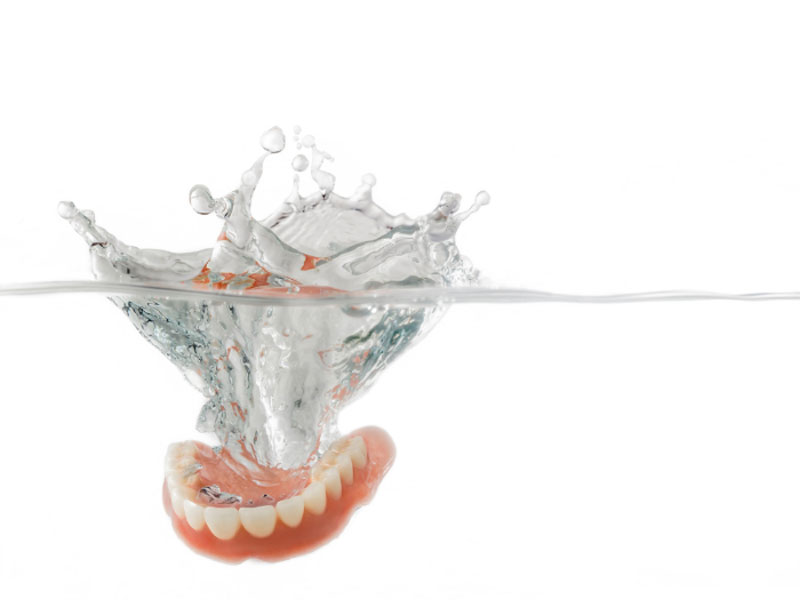The Ins and Outs of Dentures

Losing teeth is upsetting for anyone, but dentures are a fast and non-invasive way to replace them, without the need for lengthier surgeries or treatments. However, getting used to the idea of wearing dentures and understanding what to expect can take a bit longer. Firstly, it’s important to understand the differences between full and partial dentures and to know a little about how dentures are constructed.
Understanding the Difference between Full and Partial Dentures
If you lose all your upper or lower teeth or all your natural teeth, you will need what is called full or complete dentures. Full dentures restore all the teeth in your upper or lower jaw. These dentures have a base made from a hard acrylic material which is gum colored. There are lots of different shades of acrylic so our dentist Dr. Marc McRae can select the shade that most closely resembles your natural gums. This base supports your denture teeth and rests directly on your gums.
The choice of denture teeth is vast so no matter the shape or size of your natural teeth, we can choose new teeth that closely replicate them. For example, women need smaller and more feminine-shaped teeth to create a softer appearance whereas men’s teeth tend to be larger, squarer, and more masculine. The color of your replacement teeth will also match any remaining natural teeth. If you need both an upper and lower denture, you can choose any tooth shade you like. Although the temptation is to select beautiful, white teeth, it’s important to think about what shade will be most appropriate and which is complementary to your age and skin tone. Usually, it’s best to choose a shade that isn’t any whiter than your eyes.
Partial dentures are constructed in a similar way, using a gum-colored acrylic base to support the replacement teeth. Usually, this base is strengthened with metal. Many partial dentures have a substructure made from a lightweight, cobalt chrome alloy that reduces the bulk of the denture and which is comfortable to wear. Denture teeth can be selected to blend in with your existing teeth, so the overall effect is very natural. Partial dentures also rest directly on your gums, but they do have metal clasps that fit around your existing teeth. These clasps are enormously effective in helping to keep the partial denture in place.
Another crucial question asked by many patients is whether they will be left without teeth at any stage during treatment. An immediate denture ensures this isn’t the case! Immediate dentures are fabricated before your teeth are extracted and are fitted soon afterward. They are worn while your gums heal and are replaced by conventional dentures once the healing process is completed.
Is It Difficult to Get Used to Dentures?
Initially, there’s no denying that your dentures will feel quite strange, but this is the case for any type of dental appliance. Give yourself time to become accustomed to your dentures, and you’ll need to get used to eating and speaking with them. For the first few days, it can be useful to stick to eating softer foods that require minimal chewing. Our friendly dental team here at Willow Springs Dental can advise you which foods are best. As your dentures begin to feel more natural, start gradually introducing harder to chew foods. Practice speaking with your new dentures until you feel comfortable with your speech. One thing to remember is that your cheek muscles and your tongue need to get used to the feel of your denture and these muscles will learn how to keep the denture more firmly in place. If you feel the denture slipping out of place, reposition the denture using your tongue and gently bite down to re-seat it. Usually, after initially fitting the denture we will want to arrange a follow-up visit with you. During this appointment, we can recheck the fit of the denture and can make any adjustments as necessary. This is because the denture might initially rub a little, but please don’t worry because we can ensure it feels entirely comfortable. Also, it’s your chance to discuss any questions you may have about your dentures.
Caring for Your Dentures
Looking after dentures is very straightforward, but you must commit to cleaning them thoroughly each day. Dentures can be cleaned with dish soap, or if you prefer you can buy proprietary denture cleaner. Use a soft denture brush rather than a toothbrush which is too hard and could damage your denture. Avoid using harsh household cleaners that may also damage your denture. Once your denture is clean, soak it overnight, and usually, it’s best to use a proper denture soaking solution which will keep it nice and fresh. Your denture should be left out each night because this gives your gums a chance to recover.
What Should I Do If I Break My Denture?
If you break your denture, please contact us immediately so we can arrange to have it repaired. It is crucial to have your denture professionally mended as attempting to do it yourself could cause irreparable damage and especially if you use something like superglue. Denture repairs can typically be completed very quickly so you won’t be without your teeth for long.
How Long Will Dentures Last?
Dentures should last several years before they need replacing and this can depend on how well you care for them and on how well they continue to fit your gums. When natural teeth are removed, your gums and the bone underneath them will change shape. The jawbone gradually resorbs, so the bony arch that helps to keep your denture in place gradually becomes flatter and narrower. Obviously, this will affect the fit of your dentures, but we can reline them, where additional acrylic material is added to the fitting surface. Alternatively, they can be remade entirely to provide a better fit and greater retention.
Implant-Supported Dentures
Another option is to think about dental implants to secure your denture. Dental implant posts can be inserted into your jawbone, and the denture will have special attachments that clip onto the implants, giving your dentures far greater stability. It’s an option that can be well worth considering if loose dentures become a problem, and especially as often relatively few implants are needed to secure a complete denture.
Contact Willow Springs Dental today to schedule an appointment where our friendly dental team can answer all your questions about dentures.




Please login to publish a comment.
Comments (0)